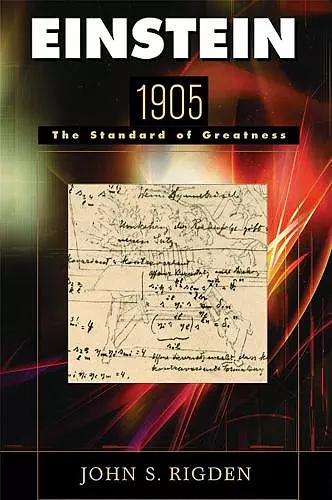Einstein 1905
The Standard of Greatness
Format:Paperback
Publisher:Harvard University Press
Published:30th May '06
Currently unavailable, and unfortunately no date known when it will be back

For Albert Einstein, 1905 was a remarkable year. It was also a miraculous year for the history and future of science. In six short months, from March through September of that year, Einstein published five papers that would transform our understanding of nature. This unparalleled period is the subject of John Rigden's book, which deftly explains what distinguishes 1905 from all other years in the annals of science, and elevates Einstein above all other scientists of the twentieth century.
Rigden chronicles the momentous theories that Einstein put forth beginning in March 1905: his particle theory of light, rejected for decades but now a staple of physics; his overlooked dissertation on molecular dimensions; his theory of Brownian motion; his theory of special relativity; and the work in which his famous equation, E = mc2, first appeared. Through his lucid exposition of these ideas, the context in which they were presented, and the impact they had--and still have--on society, Rigden makes the circumstances of Einstein's greatness thoroughly and captivatingly clear. To help readers understand how these ideas continued to develop, he briefly describes Einstein's post-1905 contributions, including the general theory of relativity.
One hundred years after Einstein's prodigious accomplishment, this book invites us to learn about ideas that have influenced our lives in almost inconceivable ways, and to appreciate their author's status as the standard of greatness in twentieth-century science.
The year 2005 [is] the centenary of Einstein's annus mirabilis, when he published the five papers that marked him as one of the greatest scientists of all time. Washington University professor Rigden sits readers down in front of his white board and explains what Einstein said in each of these papers, what was significant in them and how the scientific community reacted (not very well, in most cases--for a while)...Rigden writes with a rare felicity, free of jargon and with everyday metaphors that Einstein himself would no doubt have appreciated. * Publishers Weekly *
[A] valuable addition to the Einstein canon. -- Werner Israel * Nature *
A century ago, in 1905, Einstein proved that time, as it had been understood by scientist and layman alike, was a fiction. And this was scarcely his only achievement that year, which John S. Rigden skillfully chronicles, month by month, in Einstein 1905: The Standard of Greatness. -- Jim Holt * New Yorker *
A marvelous book...John Rigden not only summarizes accessibly [Einstein's] accomplishments of that year; he analyses the nature of scientific research...Einstein's papers are not accessible to a nonexpert by and large. But for those who feel the urge to at least try to go where they're not technically qualified with the accurate suspicion that it matters, this is the year for some physics, and John Rigden's provocative work is a place to start. -- Thomas Oliphant * Boston Globe *
Mr. Rigden is very good at evoking the vehement debates that took place over Einstein's findings...The portrait of Einstein that emerges from Mr. Rigden's account is as compelling as his theories. -- Eric Ormsby * New York Sun *
Between March and September 1905, Einstein wrote five Annalen Physik papers that would greatly influence 20th-century physics...For each paper, Rigden discusses the background, underlying ideas, content, and organization before surveying its reception and impact. General readers who wish to understand the magnitude of what Einstein accomplished during his annus mirabilis will find this lucid, nonmathematical account ideal. * Science *
In Einstein 1905: The Standard of Greatness, John S. Rigden provides a lucid account of Einstein's astonishing outburst of creativity, explaining its scientific context and impact, which include, in the case of the relativity theory, the reconstruction of both space and time and the equivalence of mass and energy. -- Daniel J. Kevles * Times Literary Supplement *
Mr. Rigden's book provides a clearly written account of these papers. It places each one in the context of the physics of the time, and explains the unique contribution Einstein made by his unerring vision for the key principles involved and his convincing solutions to the problems he tackled. -- Jeffrey Marsh * Washington Times *
[Rigden] gives an excellent overview of each of the 1905 papers. -- Alan Cane * Financial Times *
To mark the centenary of the publication of Albert Einstein's first scientific papers, the year saw a flowering of books about the 20th century's greatest thinker. The best of the bunch is John S. Rigden's book Einstein 1905: The Standard of Greatness. Rigden provides an excellent no-frills overview of five papers that Einstein published within the space of six months, transforming our understanding of nature. -- Clive Cookson * Financial Times *
A fine, slender introduction to Einstein's mind and science for the lay reader is John Rigden's Einstein 1905: The Standard of Greatness. -- Leon Botstein * New York Sun *
Rigden provides a fine account of the scientific importance of Einstein's five papers. -- PD Smith * The Guardian *
- Nominated for Pulitzer Prizes 2005
- Nominated for PROSE Awards 2004
- Nominated for National Book Awards 2005
ISBN: 9780674021044
Dimensions: 210mm x 140mm x 13mm
Weight: unknown
192 pages